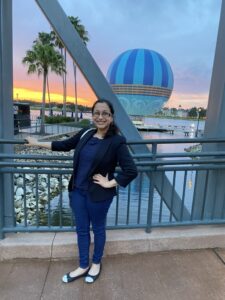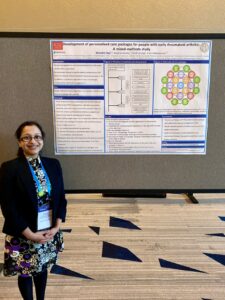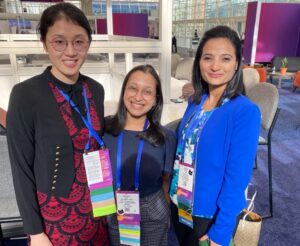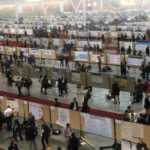 London to Orlando—Insights from Across the Pond
London to Orlando—Insights from Across the Pond
In April 2023, fresh from a British Society for Rheumatology conference and clutching my poster tube (for the first time since the pandemic), I boarded a plane for a 10-hour flight from the U.K. to Orlando, Fla. Surrounded by families excited at the prospect of meeting Mickey Mouse, I took great joy in sharing my own excitement with intrigued passengers and flight attendants who asked me about the contents of my poster tube and where I was heading. My answer: the Rheumatology Research Workshop.
Proposals, Posters & Presentations
When I saw the call for applications for this year’s Rheumatology Research Workshop, held May 16–17 in Denver, I found myself reflecting on my experience and the profound impact the 2023 program had on me. The workshop, run over two days by the ACR Early Career Investigators (ECI) Subcommittee, is aimed at trainees of all levels, from medical students to junior faculty, with an interest in a rheumatology research career. I applied after seeing an advertisement on social media and was thrilled to be offered a place.

Dr. Dey
From the start, it was clear this was a more intimate meeting than any conference I had previously attended. There was ample opportunity over the two days to meet like-minded researchers at all stages of their rheumatology training and network with leaders in the field.
The opening sessions focused on the hidden curriculum, with an inspirational keynote talk from Vicki Ellingrod, PharmD, FCCP, FACNP, Dean and John Gideon Searle Professor of Pharmacy, College of Pharmacy; professor of psychiatry, Medical School; and adjunct professor of psychology, College of Literature, Science, and the Arts; all at the University of Michigan, Ann Arbor.
Attendees then divided into two groups—students and residents, and advanced fellows and junior faculty—for one of my personal highlights of the program, the opportunity to review a brief grant proposal in small groups with faculty members. At the time, I was just a few months from commencing my PhD, so being able to discuss my project and receive feedback from peers and faculty was greatly appreciated. Listening to the array of research being conducted by fellows in the U.S. was highly insightful and afforded an excellent learning opportunity in itself.
Everyone subsequently reconvened for panel discussions on imposter syndrome and work-life balance, some of the best I had heard on these topics.

Dr. Dey presenting her research to attendees of the 2023 Rheumatology Research Workshop
The afternoon continued with another real highlight of the workshop, poster viewing and presentation practice with a faculty member. Just as in the morning, I truly appreciated the dialogue with faculty members and peers, something not always possible when presenting at larger conferences. Crucially, this set us in good stead for the networking and reception that evening, during which we presented our work to workshop attendees, faculty and attendees at the Rheumatology Research Foundation meeting, which was taking place in parallel.
The networking reception was an intimate affair, in contrast to the hustle and bustle of larger conferences, set to the backdrop of the buzz of ideas proliferating around the posters. The work I presented, on the multidisciplinary care of people with rheumatoid arthritis, has subsequently been published and formed an important element of the basis of my PhD.1 I certainly give credit to the Rheumatology Research Workshop for critically appraising my work and making me reflect on aspects of the methods and future directions that I had not considered previously.
Pen to Paper
The second day commenced with a test of our ability to summarize our research succinctly—the elevator pitch—followed by a presentation from Max Konig, MD, assistant professor of medicine, Johns Hopkins School of Medicine, Baltimore, demystifying the ABCs (or rather the Ks and Rs) of grant applications. Key take-home points for me were to remember that grants beget more grants, and 100% of grant applications that are unsubmitted do not get funded—points that are all too easy to forget.
The workshop ended with a division into early- and later-career groups, with yet more invaluable sessions covering bio-sketches, interviews and how to peer review papers. The last of these was particularly useful—peer review for journals is something we are expected to do as we progress through our research career, yet it is not routinely taught in medical school, beyond critical appraisal, nor are there many formal programs on this topic. Ruth Fernandez Ruiz, MD, MS, a rheumatologist with Weill Cornell Medicine, New York, offered a clear and perfectly pitched take on the topic for her audience of early career researchers.
Widened Horizons & New Friendships
With many standout sessions at the Rheumatology Research Workshop, the ultimate highlight for me was the opportunity to meet like-minded individuals at a similar stage of training, as well as those more senior, and to learn from their experiences. As the only international attendee, I really appreciated the warm welcome, and I particularly want to thank Sebastian Sattui, MD, MS, an assistant professor of medicine at the University of Pittsburgh, director of the UPMC Vasculitis Center and a member of the Global Engagement Committee, who reached out to me prior to the program.
Attendance at this event has broadened my horizons, and it was fascinating to hear about academic and clinical training in a system very different to that of the U.K. This brilliant initiative from the ACR, which invests in and fosters academic rheumatologists of the future, is sure to contribute to the longevity of high-quality rheumatology research in the U.S.

Dr. Dey (center) met up with new friends Ruoning Ni, MD, the University of Iowa Health Care, and Rashmi Dhital, MD, University of California, San Diego, at ACR Convergence 2023 in San Diego.
Above all, I left Orlando with new friends and colleagues from across the pond, whom I was fortunate to be able to catch up with at ACR Convergence 2023 in San Diego in November. It has been particularly heart-warming to see their budding research, which was displayed at the Rheumatology Research Workshop, subsequently blossom into successful presentations at ACR Convergence. Of course, it was also great to enjoy the Florida sunshine, some fine food and head to Disney Springs together after the sessions ended in search of Mickey Mouse.
This was undoubtedly the best, intensive research course I have attended, unique in its focus on rheumatology research. I would like to thank the ACR and the ECI subcommittee for giving me this unforgettable opportunity, and Bharat Kumar, MD, MME, FACP, RhMSUS, and the team at The Rheumatologist for the opportunity to share my experience, which I hope will encourage others to apply in future.
I would highly recommend the workshop to early career academic rheumatologists at all stages, including medical students and residents who want a taste of rheumatology research.
About the Rheumatology Research Workshop
Open exclusively to ACR/ARP members, the Rheumatology Research Workshop is an invitation-only meeting, with attendees selected on the basis of an application, letters of recommendation and abstracts of current research. Learn more.
Mrinalini Dey, MB BChir, MA (Hons) Cantab, MRCP (UK), FHEA, Dip LCM, is a trainee in rheumatology and general internal medicine at King’s College, London, where she is currently undertaking a clinical PhD fellowship. Her work focuses on the association between social determinants of health and comorbidities, and outcomes in people with inflammatory arthritis.
Reference
- Dey M, Busby A, Isaacs JD, et al. Personalised care packages for people with rheumatoid arthritis: A mixed-methods study. RMD Open. 2024 Jan 8;10(1):e003483.


